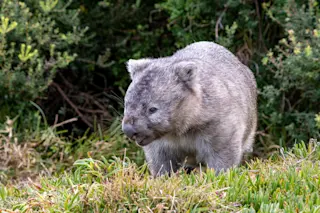When Sydney hosted the 2000 Summer Olympics, an unlikely hero emerged: an unofficial mascot known as Fatso the Fat-Arsed Wombat. Introduced by comedians, it helped to kick off a wave of love for a critter not always adored by human Australians. Over the centuries, the native marsupial has been eaten in stew and maligned as a pest. Now, it’s a focus of conservation and animal welfare efforts.
Wombats are closely related to koalas and nurture their young in pouches like other marsupials. Of the three species, one is threatened and another endangered, but the bare-nosed wombat (Vombatus ursinus), found in Southeast Australia and Tasmania and thought to number more than a million, is neither. So it’s been studied less than its hairy-nosed cousins.
“This is a species that everyone loves, but just doesn’t know too much about,” says Georgia Stannard, an archaeologist at La Trobe University in Bundoora/Melbourne.
(Credit:S. CARVER ...














